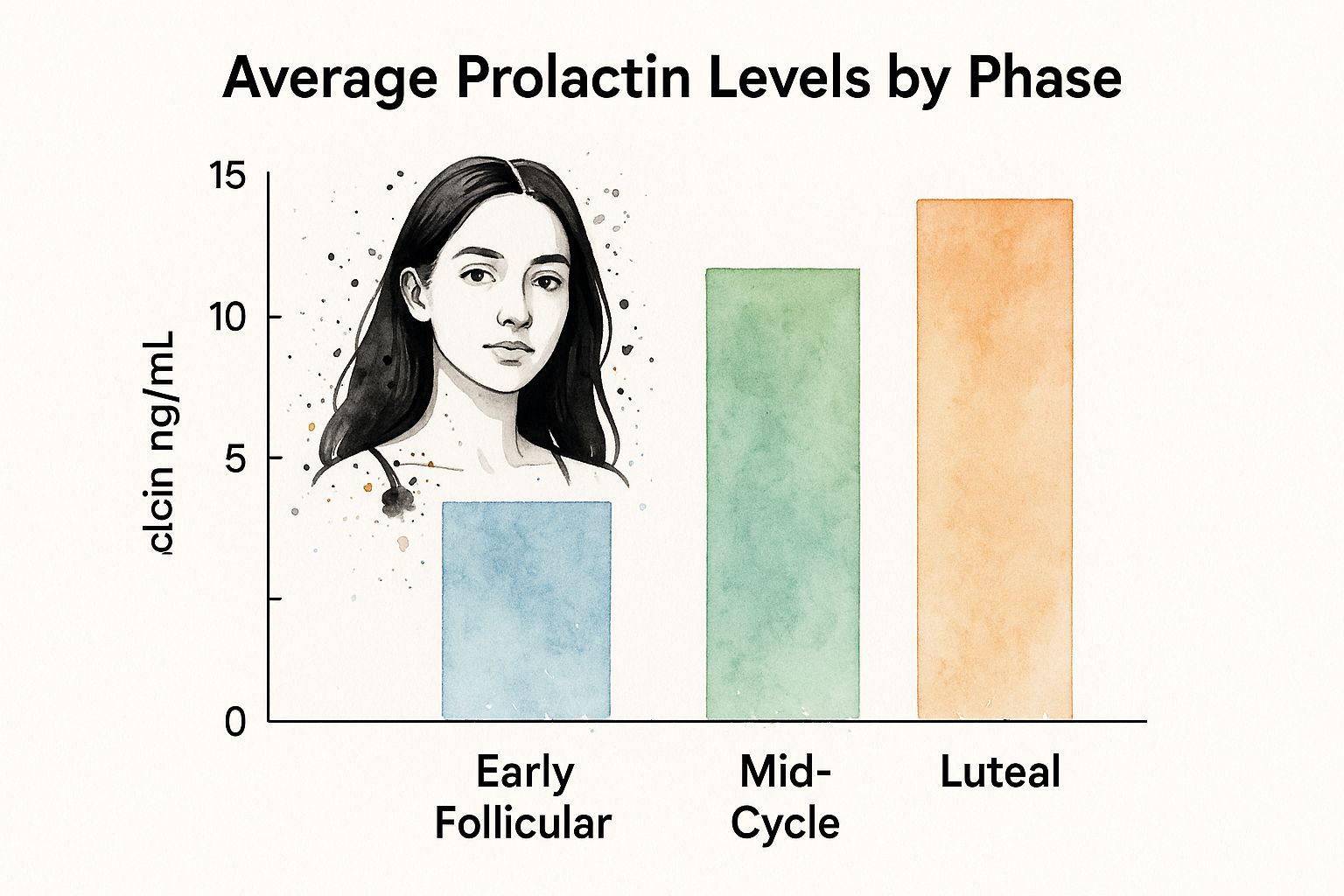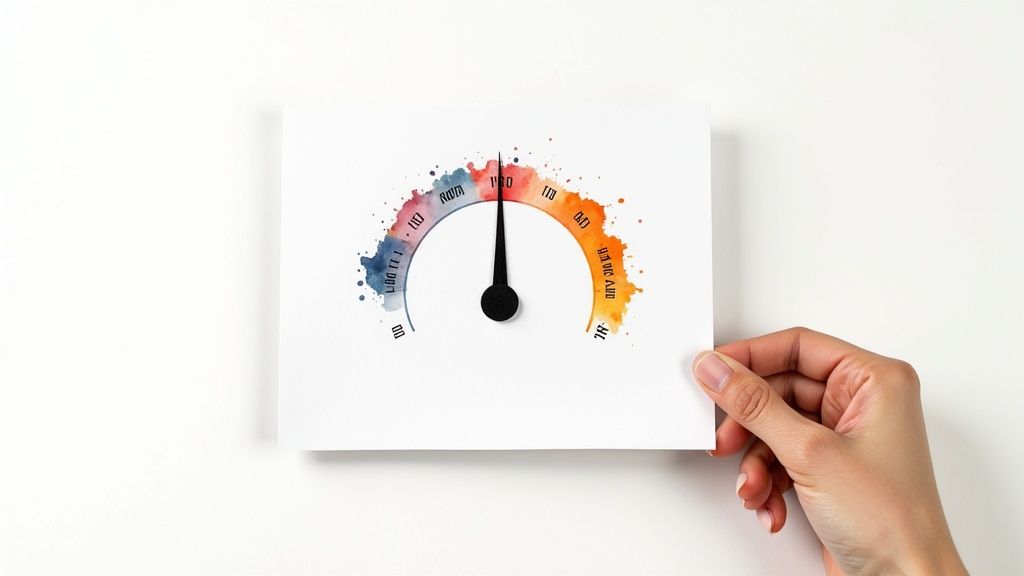Getting your test results back is a key step in taking control of your long-term health, and understanding the normal prolactin levels for females is a crucial piece of that longevity puzzle.
In the UK, the target range for a non-pregnant, non-lactating woman is typically between 102 to 496 mU/L. This single number offers a powerful glimpse into your body’s delicate hormonal balance, which is a cornerstone of healthy ageing.
Why Prolactin Is a Key Longevity Indicator
Think of your prolactin level less as a clinical number and more as a vital sign for your long-term reproductive and metabolic health. Keeping it in that optimal range is fundamental to hormonal harmony, which has a direct impact on your wellness and vitality for decades to come.
In the following table, you'll see the generally accepted prolactin ranges for females at different stages of life here in the UK.
Typical Prolactin Reference Ranges for Females (UK)
| Life Stage | Typical Prolactin Range (mIU/L) |
|---|---|
| Non-pregnant women | 102–496 |
| Pregnant women | 386–9,920 |
| Postmenopausal women | 66–496 |
These ranges, measured in milli-international units per litre (mIU/L), act as a benchmark. A result within the expected range suggests a well-regulated pituitary gland, which is essential for managing the hormonal shifts that occur as you age.
Prolactin's Natural Rhythm
Your prolactin levels aren't static; they naturally ebb and flow with your menstrual cycle. It’s a subtle variation, but it’s a completely normal part of your body's intricate hormonal dance.
This chart shows a great visual of how average prolactin levels tend to shift throughout the different phases of a typical cycle.

As you can see, levels are usually at their lowest in the early follicular phase and then gently rise through the mid-cycle and luteal phases.
Staying within these ranges signals that your endocrine system is working as it should, a key factor in preventing age-related health issues and promoting longevity. Consistently high or low levels can be an early warning sign that something needs a closer look, offering a window of opportunity for proactive intervention.
Making sense of these numbers is genuinely empowering. If you're building a proactive longevity plan, the convenience and insights from at-home health testing can be invaluable. It gives you the data you need to make informed decisions for a longer, healthier life.
What Prolactin Does and Why It Matters for Longevity

Let’s go deeper than lab report numbers and talk about what prolactin is actually doing inside your body. Think of your pituitary gland as mission control for your hormones. Prolactin is one of its key signals, influencing systems far beyond reproduction.
While it’s most famous for enabling milk production, its influence is much broader. Prolactin is a key conductor in the hormonal orchestra that regulates your menstrual cycle and plays a big part in fertility.
But its job doesn't stop there. In fact, keeping prolactin levels in a healthy range is a cornerstone of long-term wellness for women and a critical piece of any longevity strategy.
The Connection Between Prolactin and Healthy Ageing
When prolactin levels are chronically high, it disrupts the balance of other crucial hormones, particularly oestrogen. This isn’t just about your monthly cycle; it creates a ripple effect that can impact your health for decades.
For instance, healthy oestrogen levels are vital for maintaining strong bones. When prolactin is consistently elevated, it suppresses oestrogen. Over many years, this can contribute to a loss of bone mineral density, putting you at greater risk of osteoporosis later in life. Actionable insight: Getting your prolactin in check is a proactive way to protect your future skeletal health.
Hormonal harmony is also deeply tied to your metabolic health. A well-regulated endocrine system helps maintain stable energy, an efficient metabolism, and a balanced mood. When prolactin is out of sync, it can throw these systems off kilter, potentially impacting long-term metabolic function.
Think of balanced prolactin as a form of preventative maintenance for your body. By keeping this hormone in its optimal range, you’re not just addressing immediate fertility concerns. You’re also investing in the future resilience of your skeletal, metabolic, and emotional health, which is the very essence of a longevity-focused lifestyle.
This shifts the conversation around prolactin. It's not just a reproductive hormone; it's a key player in your personal strategy for healthy ageing. Understanding its wide-ranging influence empowers you to see your blood test results as more than a snapshot of today—they're a valuable insight into your long-term wellness journey.
Spotting the Signs of a Prolactin Imbalance

When your body’s hormonal symphony hits a wrong note, it sends out tell-tale signs. Learning to recognise these clues is an actionable first step toward taking charge of your health, especially when it comes to maintaining normal prolactin levels in females. An imbalance can quietly disrupt your body’s rhythm, but the symptoms are often clear once you know what to look for.
The most common issue is high prolactin, or hyperprolactinemia. It’s not as rare as you might think; studies in the UK suggest that up to 10% of women may experience it. In fact, it's a frequent finding in NHS endocrine assessments. You can dive deeper into the connection between prolactin and fertility to understand its full impact.
Common Signs of High Prolactin
Too much prolactin directly interferes with the hormones managing your menstrual cycle. This disruption often shows up in noticeable ways that serve as early warnings.
Keep an eye out for these key symptoms:
- Irregular or missed periods: Often the first and most obvious sign that your hormonal balance is off.
- Trouble conceiving: High prolactin can halt ovulation, making pregnancy difficult.
- Unexpected breast milk (galactorrhoea): This can happen even when you aren't pregnant or breastfeeding.
- A dip in libido: A significant drop in sex drive can be another sign of this hormonal disruption.
Realising these patterns are linked is a powerful actionable insight. Connecting symptoms like unpredictable cycles or low libido to a potential hormonal issue can turn confusion into clarity, empowering you to seek answers and protect your long-term health.
What if Prolactin Levels Are Too Low?
While far less common, it's also possible to have prolactin levels that are too low. This condition, called hypoprolactinemia, is typically linked to an underactive pituitary gland.
The main sign of low prolactin is an inability to produce enough milk after giving birth. Because this condition is so rare and its symptoms are specific to the postpartum period, most of the focus in longevity discussions is on the more widespread issue of high prolactin.
No matter the direction of the imbalance, addressing it early is a vital part of any long-term wellness strategy.
Uncovering the Causes of Abnormal Prolactin Levels
Abnormal prolactin levels rarely just happen. Think of them as a signpost pointing to something else going on in your body. Getting to the root cause is the most important actionable step towards restoring your hormonal balance for the long haul.
Sometimes, the culprit is just life itself. A really intense workout, a period of high emotional stress, or even a bad night’s sleep can cause a temporary spike. These fluctuations are usually short-lived and your levels will settle back down once the trigger is gone.
But when those levels stay consistently high, it’s a signal to dig deeper. By connecting the dots between your symptoms and lifestyle, you can have a much more productive, longevity-focused conversation with your doctor.
Common Medical and Lifestyle Triggers
Several medical conditions are well-known for disrupting normal prolactin levels in females. Once you and your healthcare provider pinpoint the source, you can create a clear plan to get things back on track and mitigate long-term risks.
The most common causes we see are:
- Prolactinomas: These are tiny, benign (non-cancerous) growths on the pituitary gland that churn out extra prolactin. They are by far the most frequent cause of significantly high levels.
- Underactive Thyroid (Hypothyroidism): If your thyroid isn't producing enough hormones, the body sometimes releases more of a hormone called TRH, which can then tell the pituitary to release more prolactin.
- Polycystic Ovary Syndrome (PCOS): The relationship here is still being studied, but it's not unusual for women with PCOS to also have mildly elevated prolactin.
Understanding the 'why' behind an abnormal result is empowering. It shifts the focus from a confusing number on a lab report to a clear, actionable insight about your body's inner workings, allowing you to take targeted action for your future health.
It’s also worth noting that certain prescription medications can interfere with prolactin regulation. Some antidepressants, certain blood pressure drugs, and even some treatments for acid reflux can raise prolactin levels. This is why it’s so important to review every medication you're taking with your doctor when you get your results as part of your holistic health strategy.
How to Get the Most Accurate Prolactin Test Results


